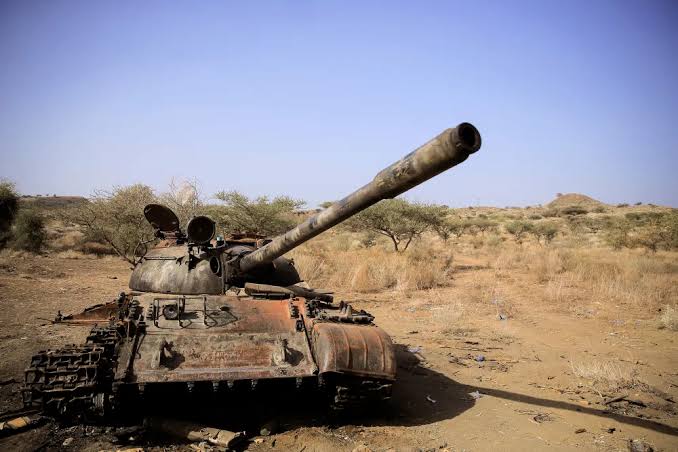Facebook Twitter Instagram Somali Magazine - People's Magazine
Ethiopia and Eritrea appear to be edging closer to war as both nations rapidly deploy troops along their shared border, raising alarm across the Horn of Africa. Military buildup on both sides has fueled concerns that the region could once again be plunged into conflict, just years after the devastating war in Tigray.
Lt. Gen. Tsadkan Gebretensae, Vice President of the Interim Administration of Tigray, has warned that war between Ethiopia and Eritrea “seems inevitable,” emphasizing that military preparations are nearly complete. In an opinion piece for The Africa Report, he cautioned that Tigray could once again become a battleground and that the window for diplomatic intervention is closing fast.
The renewed hostilities stem from unresolved grievances following the 2020-2022 Tigray war, Ethiopia’s shifting geopolitical ambitions, and internal political struggles within Tigray. Although the Pretoria Agreement, signed in November 2022, officially ended the conflict between Ethiopia’s federal forces and the Tigray People’s Liberation Front (TPLF), many of its provisions remain unfulfilled, particularly regarding troop withdrawals and territorial disputes. Eritrea, which had supported Ethiopian forces during the war, has distanced itself from the agreement, further complicating the fragile peace.
Adding to the tensions, Ethiopia’s recent push for maritime access has heightened regional anxieties. Prime Minister Abiy Ahmed’s government struck a controversial deal with Somaliland to secure access to the Gulf of Aden, a move that Eritrea views as a direct threat. Many analysts believe Eritrea fears that Ethiopia could attempt to reclaim control of its former ports in Assab and Massawa, which Eritrea gained after its independence in 1993. In response, Eritrean authorities have mobilized their military reserves and increased troop presence along the southern border, signaling preparations for a possible confrontation.
Ethiopia’s internal instability is also a growing concern. The once-dominant TPLF is now fractured, with rival factions led by former chairman Debretsion Gebremichael and interim leader Getachew Reda. Reports indicate that dissident Tigrayan Defense Forces (TDF) units have seized control of areas in eastern Tigray, raising fears of further internal strife that could spill into a broader regional conflict. As Ethiopia grapples with these divisions, Eritrea is accused of exploiting the situation to weaken the already fragile Pretoria Agreement.
Eritrean officials, however, deny any role in escalating tensions. Information Minister Yemane G. Meskel rejected claims that Eritrea is interfering in Ethiopia’s internal matters, stating that “the Pretoria Agreement concerns Ethiopia’s internal affairs and should not be extended beyond its borders.” However, Ethiopian leaders have accused Eritrea of meddling in Tigray’s affairs, deepening distrust between the two governments.
International observers warn that if the situation continues to deteriorate, it could have serious consequences for the entire Horn of Africa. A recent Foreign Policy report called for urgent intervention from the African Union, Gulf nations, and Western powers to prevent full-scale war. Analysts fear that if left unchecked, the conflict could spread beyond Ethiopia and Eritrea, further destabilizing neighboring Sudan, where ongoing civil war has already created a severe humanitarian crisis.
The Horn of Africa remains a critical geopolitical region due to its proximity to the Red Sea, one of the world’s busiest trade routes. Any large-scale conflict between Ethiopia and Eritrea could disrupt global commerce, impacting shipping routes and exacerbating economic instability in an already fragile region.
As diplomatic efforts scramble to defuse tensions, the world watches closely. Without swift and effective intervention, Ethiopia and Eritrea could once again find themselves locked in a devastating war, with dire consequences for the region and beyond.

